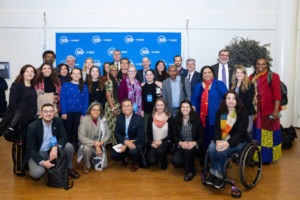From 13 to 15 December 2023, IDOS participated in the Global Refugee Forum (GRF) organised by UNHCR in Geneva. During this event, IDOS pledged to further promote equitable practices in the collaborations with its research partners and thereby contribute to more localised knowledge production.

This includes institutionalising partnerships, supporting networking and strengthening joint research development. The institute committed to also providing access to data and other research resources, advocating for localised knowledge among policy-makers, and involving research partners in policy advice activities. Furthermore, IDOS pledged ongoing support for scholars at risk.
This self-commitment is part of the Multi-Stakeholder Pledge “Shifting Power – Advancing Localisation of Research and Elevating the Voices of Host and Forcibly Displaced Communities Globally”, an initiative led by IDOS jointly with the Local Engagement Refugee Research Network (LERRN), the International Development Research Centre (IDRC) and the Global Academic Interdisciplinary Network (GAIN). The pledge represents a collective commitment to amplify locally produced knowledge, empower communities affected by forced migration and foster equitable partnerships within academia. During the GRF, the Multi-Stakeholder Pledge was announced in the plenary in a short intervention by the GAIN representative.
In addition, as part of the FFVT project, IDOS co-organised a pre-GRF academic workshop in Geneva with LERRN, GAIN and the Geneva Graduate Institute (IHEID) to discuss the role of academia in the evidence-based implementation of the Global Compact on Refugees on 11 December. The panel discussion and moderation was led by researchers and refugee researchers from or based in countries of the global South, IDOS colleague Dr Musallam Abedtalas being one of them. In their critical debate, they highlighted the importance of academic evidence and localised knowledge, while remaining aware of the limited influence academia can have in political fora like the GRF. At the same time, they pointed to prevailing barriers in international research cooperation and growing security threats for researchers from countries of the Global South and refugees or refugee researchers, particularly when engaging in policy advice and providing academic evidence in an increasingly politicised world. Therefore, they emphasized the necessity of more careful, ethical and self-reflexive research and solidarity.
With these activities, IDOS contributes to highlighting the relevance of localised research and knowledge production, equitable partnerships, the promotion of research infrastructure in countries of the Global South, and the active participation of refugees in research processes. This kind of locally grounded research is crucial for humanitarian and particularly development endeavours, as it strengthens local research capacities and, through appropriate local participation throughout the research process, it leads to context-specific solutions that enable more tailored policy advice.

Schreibe einen Kommentar